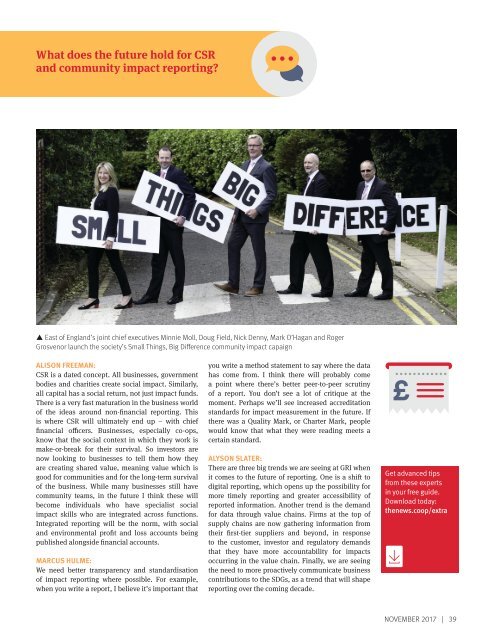November 2017
You also want an ePaper? Increase the reach of your titles
YUMPU automatically turns print PDFs into web optimized ePapers that Google loves.
What does the future hold for CSR<br />
and community impact reporting?<br />
p East of England’s joint chief executives Minnie Moll, Doug Field, Nick Denny, Mark O’Hagan and Roger<br />
Grosvenor launch the society’s Small Things, Big Difference community impact capaign<br />
ALISON FREEMAN:<br />
CSR is a dated concept. All businesses, government<br />
bodies and charities create social impact. Similarly,<br />
all capital has a social return, not just impact funds.<br />
There is a very fast maturation in the business world<br />
of the ideas around non-financial reporting. This<br />
is where CSR will ultimately end up – with chief<br />
financial officers. Businesses, especially co-ops,<br />
know that the social context in which they work is<br />
make-or-break for their survival. So investors are<br />
now looking to businesses to tell them how they<br />
are creating shared value, meaning value which is<br />
good for communities and for the long-term survival<br />
of the business. While many businesses still have<br />
community teams, in the future I think these will<br />
become individuals who have specialist social<br />
impact skills who are integrated across functions.<br />
Integrated reporting will be the norm, with social<br />
and environmental profit and loss accounts being<br />
published alongside financial accounts.<br />
MARCUS HULME:<br />
We need better transparency and standardisation<br />
of impact reporting where possible. For example,<br />
when you write a report, I believe it’s important that<br />
you write a method statement to say where the data<br />
has come from. I think there will probably come<br />
a point where there’s better peer-to-peer scrutiny<br />
of a report. You don’t see a lot of critique at the<br />
moment. Perhaps we’ll see increased accreditation<br />
standards for impact measurement in the future. If<br />
there was a Quality Mark, or Charter Mark, people<br />
would know that what they were reading meets a<br />
certain standard.<br />
ALYSON SLATER:<br />
There are three big trends we are seeing at GRI when<br />
it comes to the future of reporting. One is a shift to<br />
digital reporting, which opens up the possibility for<br />
more timely reporting and greater accessibility of<br />
reported information. Another trend is the demand<br />
for data through value chains. Firms at the top of<br />
supply chains are now gathering information from<br />
their first-tier suppliers and beyond, in response<br />
to the customer, investor and regulatory demands<br />
that they have more accountability for impacts<br />
occurring in the value chain. Finally, we are seeing<br />
the need to more proactively communicate business<br />
contributions to the SDGs, as a trend that will shape<br />
reporting over the coming decade.<br />
Get advanced tips<br />
from these experts<br />
in your free guide.<br />
Download today:<br />
thenews.coop/extra<br />
NOVEMBER <strong>2017</strong> | 39


















